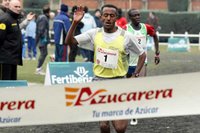The influx of African athletes has transformed this month's Asian Games in Doha Qatar. Former Africans have won at least 15 medals for Bahrain and Qatar who now have a total of 27 medals between them placing these countries in the top echelon of Asian nations at the games.
The Guardian
article from last year covers how Qatar went about the business of acquiring athletes.
The Qatari commitment to buying sporting success started in 1999, with the bulk purchase (in every sense) of seven Bulgarian weightlifters. The International Olympic Committee's rules define a three-year period for change of nationalities, but Qatar persuaded the Bulgarian Olympic Committee to waive that rule. The modest success of the Bulgarian lifters in Sydney, a single bronze medal by Said Asaad, did not dampen enthusiasm for the idea.
With the Athens Olympics fast approaching Qatar was back at it.
Athletics was next on the shopping list, and Kenyan athletes were targeted. Qatar reaped their richest reward with the signature of the world's best steeplechaser, Stephen Cherono, though this time they could not persuade the Kenyan Olympic Committee to let him compete in Athens.
Stephen Cherono has been Saif Saaeed Shaheen of Quatar for over three years and has shatters the Asian records for the 10000, 5000 and 3000 Steeplechase and made a lot of doe. There is nothing wrong with a big pay day and Saif Saaeed Shaheen has been pretty open about it. I even remember him having a good sense of humor mocking his new name.
All these moves led to International Olympic Committee chief Jacques Rogge’s condemnation of
mercenary athletes.
But that did not stop the shopping.
Roland Schoeman is no ordinary swimmer, so when Qatar came knocking on his door last month, the South African Swimming Federation were close to panic. Olympic sport in South Africa is in critical condition and the prospect of a Commonwealth Games in Melbourne next March without Schoeman, who had been inked in to win four titles in a potential South African total as low as six, was too dire to contemplate.
The Qatari’s were offering £4.5m which was one-third of the entire swimming budget on one swimmer. They did not succeed in South Africa but that did not stop them and they were able to get Duje Draganja the Olympic silver medallist in the 50m freestyle at Athens. There acquisition took an interesting twist in that the Croatian public opinion largely turned against Draganja, the press portraying him as a villain with no respect for his homeland. Draganja accepted a Qatar passport in August 2005 claiming that he will keep his Croatian passport and will not change his religion. However, in February 2006 he reversed his decision and will not compete for Qatar.
So, it was with interest that I read this
article about a very talented runner called Maryam Yusuf Jamal of Bahrain who has won two medals at this week's Asian Games in Doha.
Ethiopian-born Maryam Yusuf Jamal insists her decision to switch allegiance to Bahrain was borne out of love of athletics, not for money.
Oil and gas rich Bahrain and Qatar have between them won 22 Asian Games medals in athletics, 15 of which came from former Africans who have switched citizenship.
Maryam Yusuf Jamal the former Zenebech Tola Kotu says her reason for changing allegiance is that "she chose Bahrain when Ethiopian athletics chiefs shunned her because of her tribal background."
In 2002 she left Ethiopian and applied for political asylum in Switzerland and had been away for two years before she cleared the 1500m Olympic standards at Luzern and asked the Ethiopian federation to include her in the team for Athens. The federation of course did not include her and it seems like there is a bit of bitterness still lingering. Her husband Mnashu Taye now known as Tareq Sabt Hasan calls Ethiopia's refusal to select her "stupid".
There is nothing stupid about this decision. I don’t see any reason why the federation should pick a runner that hasn't been part of the national training group for a couple of years. Ethiopia has many deserving athletes and there is always the shortage of resources. Clearing the Olympic standards on its own is not sufficient for being selected to the Olympic team.
Regarding money, the couple keeps insisting that the change of allegiance it wasn’t for money and that they are different from Kenyan athletes. There is an
element of truth to this. Perhaps her impatience to work within the Ethiopian system sent her on this detour. Perhaps she would have never emerged from the huge pool of talent had she stayed in Ethiopia. If Ethiopia wouldn’t take her was Bahrain her only option? Why would one jump through hoops, changing names and religion when there are other options? Judging from this
article it seems like Maryam Yusuf Jamal has encountered some culture shock.
Bahrain: 'Indecent outfit' worn by athlete angers lawmaker
An outfit worn by a Bahraini athlete last week at an international track meet has caused an outrage in Bahrain.
A leading parliamentarian blasted the sports authorities for "disrespecting Islamic precepts and offending local values".
The published picture of Maryam Jamal dressed in a short sleeveless top and shorts after winning in the 3,000 metres in Oslo.
Islamist lawmaker Hamad Al Muhannadi yesterday said: "We were all shocked by the look of the young woman who was representing Bahrain at the international gathering. The outfit is not in any way related with the normal clothes that Bahraini young women are accustomed to wearing."...
"We are all aware of the mental, emotional and physical importance of sports and we want to promote athletic activities. However, we must ensure that they are within the perimeters of Islam and our local traditions," the legislator said....
I am not against Athletes changing citizenship for money. If I had talent that someone would pay for, that's something I would do. Athletes work hard and they face a lot of insecurity so they owe it to themselves to make as much money as they can when they can. So I don’t blame the athletes. What I think is disguising is the empty nationalism of Bahrain and Qatar and the corrupting influence their money has had on the federations of poor nations.
Maryam Yusuf Jamal could turn out to be an Olympic medalist that got away. But that's not a big deal since Ethiopia has so much talent that goes untapped. Let’s face it - it’s hard to become a track star in Ethiopia. Zenebech Tola Kotu, even with an Olympic medal wouldn’t have been noticed too much. With so much talent and so much ambition in Ethiopia the the era of the individualistic athlete is upon us. The bottom line is that the world has changed and this isn't going to be the last time we hear such a story.
 3-Dec-06 Disproving doubters. Proving Berlin was not a fluke. Haile showed that he can beat anyone by defeating two-time World Marathon champion Jaouad Gharib of Morocco. 2006 is the year we witnessed Haile became a complete marathoner.
3-Dec-06 Disproving doubters. Proving Berlin was not a fluke. Haile showed that he can beat anyone by defeating two-time World Marathon champion Jaouad Gharib of Morocco. 2006 is the year we witnessed Haile became a complete marathoner.  11-Mar-06 In Moscow, Meseret Defar defended here 2004 World Indoor 3000 M title easily defeating World record holder and home favorite Liliya Shobukhova. It seems like the sky is the limit for Meseret Defar.
11-Mar-06 In Moscow, Meseret Defar defended here 2004 World Indoor 3000 M title easily defeating World record holder and home favorite Liliya Shobukhova. It seems like the sky is the limit for Meseret Defar. 12-Mar-06 Kenenisa became the first athlete win a World Outdoor Championships, a World Cross Championships and a World Indoor Championship. He toyed with the field wining over 3000 M at the World Indoor Championships.
12-Mar-06 Kenenisa became the first athlete win a World Outdoor Championships, a World Cross Championships and a World Indoor Championship. He toyed with the field wining over 3000 M at the World Indoor Championships. 10-Sep-06 Once again Meseret Defar wins a race. Only this time it’s controversial because Tirunesh Dibaba’s loss cost Tirunesh $125,000. We now have ourselves a rivalry. May the best woman win.
10-Sep-06 Once again Meseret Defar wins a race. Only this time it’s controversial because Tirunesh Dibaba’s loss cost Tirunesh $125,000. We now have ourselves a rivalry. May the best woman win.  3-Jun-06 Meseret Defar sets a new Womens 5000 M world record 14:24.53, snatching the record from Turkey’s ex-Ethiopian runner Elvan Abeylegesse's. It was a 0.15 second improvement. Nonetheless, this one was sweet.
3-Jun-06 Meseret Defar sets a new Womens 5000 M world record 14:24.53, snatching the record from Turkey’s ex-Ethiopian runner Elvan Abeylegesse's. It was a 0.15 second improvement. Nonetheless, this one was sweet.  22-Oct-06 The way Berhane Adere disposed of Galina Bogomolova in the Chicago marathon made us wonder if she should have been marathoning all along. She sure looked like a natural setting a new Ethiopian record of 2:20.47.
22-Oct-06 The way Berhane Adere disposed of Galina Bogomolova in the Chicago marathon made us wonder if she should have been marathoning all along. She sure looked like a natural setting a new Ethiopian record of 2:20.47. 26-Sep-06 Haile Gebrselassie and Gete Wami set Ethiopian records while winning this Marathon Majors event. This was a reminder that they have not faded yet. Gete ran 2:21:24 and this record was later broken by Berhane Adere.
26-Sep-06 Haile Gebrselassie and Gete Wami set Ethiopian records while winning this Marathon Majors event. This was a reminder that they have not faded yet. Gete ran 2:21:24 and this record was later broken by Berhane Adere.  2-Apr-06 Running two races in two days in, 2002,2003,2004,2005 and now 2006 Kenenisa Bekele wins the long and short race at the World Cross Country Championship. Kenenisa has won ten titles during the last five years and single handedly brought an end to the era of Kenyan cross country dominance. No one will ever dominate this event like Kenenisa Bekele has.
2-Apr-06 Running two races in two days in, 2002,2003,2004,2005 and now 2006 Kenenisa Bekele wins the long and short race at the World Cross Country Championship. Kenenisa has won ten titles during the last five years and single handedly brought an end to the era of Kenyan cross country dominance. No one will ever dominate this event like Kenenisa Bekele has. 




